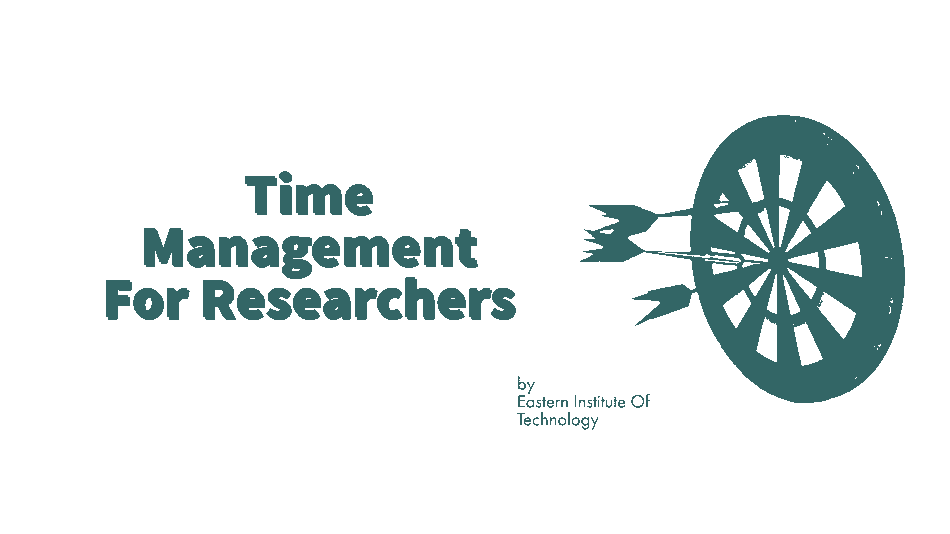Time Management for Researchers

This guide;
- explains the importance of good time management while studying;
- describes why and how to plan; and
- how to become an effective planner.
Time management techniques are important to being a successful student.
Poor time management skills can be a major factor of students failing to succeed, and not because the course work is too hard for them.
Planning Study Time Templates
Why is time management important?
You can overcome this by having good time management skills, prioritizing tasks and having a good balance of study, family, work and extra-curricular activities.
- Can we squash five minutes into one minute?
- Can we create more time and put it into our day?
- Can we really manage time?
- NO, we can’t manage time itself
But, we can manage what we do in the time available.
In other words, we can manage ourselves.
Managing ourselves means we as individuals control what we do, and when we do it in the 24 hours we have each day.
To make sure we manage ourselves – and therefore our time effectively, we need to decide what’s important to ourselves now – our goals and utilize planning to make sure we achieve them.
Planning
Planning will allow us to identify what we need to do, how important it is and when we need to do it.
This gives us many benefits:
- Achieve more
- Higher efficiency
- Gain leisure time
- Feeling of satisfaction from achieving tasks/goals
- Tasks or deadlines not hanging over you
- Gaining confidence in ability to handle different tasks
Planning is essentially the timetabling of tasks needing to be done to achieve a certain goal. You choose the tasks, you choose the priority.
A plan acts like a map, when following a plan you can see how for you have progressed towards your goal and how far you still have to go. This is great for monitoring progress and allows for changes if needed.
Planning allows you to see problems before you encounter them, Planning allows you to make adjustments to your plan to avoid crises before they arise, rather than having to deal with the unexpected.
How to plan
- Use an annual plan to plan for the semester. Include your major goals, assignment deadlines, and exam times.
- Use a weekly planner or diary to plan your week. Have a list of things to do and completion dates.
- Break large goals into smaller tasks.
- Don’t underestimate the time needed for study.
- Be specific about study times, and stick to them.
- Make better use of small blocks of time, such as time between classes or waiting for the bus.
- To help commit content to memory – set aside time to review notes from class every day.
- Start your plan with things you have to attend like class, work and family commitments, then add blocks of study time.
- Make sure your plan has a balance of study vs reward time.
- Be realistic about your tasks, leave time for emergencies and down time.
Effective planning
Effective planning looks at the order of your tasks and how long they take, to achieve this we need to become more self aware. Get to know your learning style, are you kinesthetic, auditory or visual (http://varklearncom.digiwebhosting.com/the-vark-questionnaire/).
Acknowledge your concentration span, do you have a short attention span of 20–30 minutes, if so take lots of small breaks. Do you have a long attention span of 1–2 hours, if so give yourself equal study versus break time.
Know your energy cycle, some students study better in the morning, some better at night. Think about when you study more effectively and try and arrange your studying time around this.
Time stealers are the enemy of time management. These are the things that put you behind or stop certain tasks being done when they should. Everybody procrastinates, however some people continue to procrastinate even when they know they are in danger of failing. Procrastination is putting off tedious, difficult of boring tasks and doing something more enjoyable like surfing the web or reading lots of interesting yet irrelevant material. Stay with the purpose and focus of your research. If you find other exciting stuff to read, take a note of it and get back your original topic.
One of the main causes of procrastination can be perfectionism. Students who are too scared to start because they are afraid they will get it wrong. This cause stress levels to rise and can cause anxiety. If you tend to procrastinate think about why you do this, and try and do something to reduce the cause.
Learn to prioritise, this is sorting out what’s important, what’s urgent and what isn’t.
“Time stealers are the enemy of time management… Stay with the purpose and focus of your research”
Reference:
http://www2.eit.ac.nz/library/ls_guides_timemanagement.html
